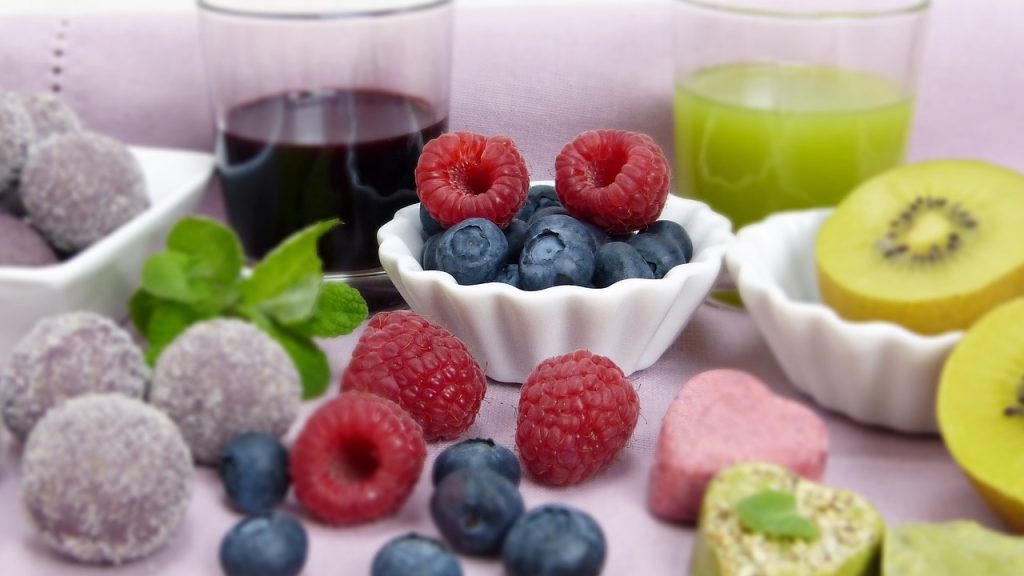The term “diet” is usually associated with numerous sacrifices and an unpleasant feeling of hunger. Such an attitude arose due to the use of more or less justified diets, e.g. single-ingredient diets. They consist of a several-week-long, tiring regime, usually followed by the “yo-yo effect”, i.e. gaining weight again, sometimes resulting in even more body weight than before the start of weight loss.
Principles of healthy eating and appropriate selection of food products
Instead of losing weight, we lose motivation. But a diet does not have to be unpleasant at all. The key to success is the right choice of nutrients. The diet should not consist of a regime of several weeks, but of a permanent change in eating habits, which will be the most important element of a new, healthy lifestyle.
It is more beneficial to give up 2-3 large meals in favor of 5 smaller meals. Then we do not lead to unnecessary stretching of the stomach walls. 3 meals (breakfast, lunch, dinner) should be basic meals, and the other 2 (second breakfast, afternoon snack) are meals in the form of healthy snacks, such as: natural yogurt, kefir and fruit or vegetables.
- Gradually reduce the amount of food you eat
When we drastically reduce the volume of meals, we may feel hungry and irritated. Therefore, you should gradually reduce portions (e.g. 4 slices, 3 slices, and then 2 slices).
- Use low-calorie substitutes
It is worth replacing high-calorie products with low-calorie ones. You can then eat more without remorse. For example, additives to sauces, soups, salads in the form of mayonnaise and fat cream can be replaced with 2% natural yoghurt or 12% cream.
It would also be necessary to replace 3.5% fat milk with 0.5% milk. A glass of fat milk contains 6 g more fat than 0.5% milk. The recommended amount of fat is in the range of 27–37 g per day. Just drinking 4 glasses of 3.5% milk covers the daily requirement for this ingredient.
Give up fatty meats
Choose lean meats (veal, rabbit, turkey and chicken) and fish (cod, pollock, hake, trout, salmon, tuna, herring). Due to the high fat content, contraindicated types of meat are: pork, mutton, geese and ducks.
Replace sweets with fruit, especially with a low glycemic index (GI) (apples, pears, peaches, grapefruits, raspberries, strawberries, cherries, black currants) or with a medium glycemic index (GI) (kiwi, mango, blueberries, pineapples, green bananas). These fruits contain less simple sugars and more fiber compared to fruits with a high glycemic index (GI) (melons, watermelons, peaches, and canned pineapples).
Products with a low and medium glycemic index (GI) are welcome in the menu of a person who wants to get rid of unnecessary kilograms. This is because they cause a slow, relatively small increase in blood glucose (sugar) concentration, and thus a small insulin release. Due to the fact that products with a low glycemic index are digested more slowly, the feeling of satiety lasts much longer.
Give up unhealthy snacks
Give up snacks such as chips, sticks, cookies, fast food products. They are a source of “empty” calories. They contain a large amount of fat, carbohydrates and salt, but at the same time little fiber, vitamins and minerals. These foods provide a huge number of calories, but only satisfy hunger for a while. The lack of satiety is due to the fact that these foods contain a negligible amount of dietary fiber. Therefore, you should eat products that are a rich source of vitamins, minerals and fiber, i.e. vegetables, fruits, bran, wheat germ, nuts.
- Exclude juices and carbonated drinks from your diet
They are the main source of simple sugars, which when consumed in excess are converted into adipose tissue. These drinks can be replaced with mineral water, coffee, fruit and herbal tea. It is recommended to drink 1-2 liters of water a day.
- Give up white bread in favor of whole grain cereal products
Even though whole grain bread provides more calories than white bread, it’s recommended to eat it because it contains a high amount of fiber. Thanks to this, we feel full longer. In addition, dietary fiber, especially water-soluble fiber, plays an important role in the prevention of atherosclerosis – it reduces the concentration of total cholesterol and the atherosclerotic fraction of LDL.
Choose the right cooking techniques
It is worth replacing frying with other culinary techniques that do not increase the fat content of the dish during its preparation. The best cooking treatments are: cooking in a small amount of water, steaming, baking in the oven or in a combi cooker, grilling, baking in aluminum foil or parchment paper and stewing without adding fat.
In addition to careful selection of food and following the principles of proper nutrition, the above advice should be supplemented with increased physical activity, which perfectly supports healthy weight loss. Doing sports speeds up metabolism, helps shape the body and improves well-being and self-esteem. The effects of lifestyle changes are visible faster. They are an excellent motivation to continue following the principles of proper nutrition.
